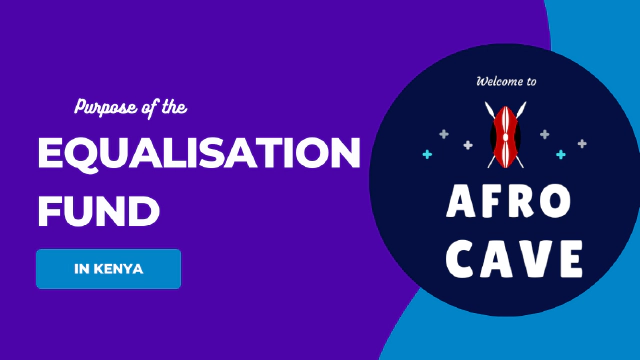Article 204 of the Constitution establishes the Equalisation Fund in Kenya which shall be paid one-half per cent (0.5%) of all the revenue collected by the national government each year.
The amount is calculated based on the most recent (Auditor General’s) audited accounts of revenue received, as approved by the National Assembly.
The national government shall use the Equalisation Fund only to provide basic services to marginalised areas. These services include water, roads, health facilities and electricity.
The national government shall provide these services to the extent necessary to bring the quality of those services in marginalised areas to the level generally enjoyed by the rest of the nation, so far as possible.
The national government may use the Equalisation Fund–
- only to the extent that the expenditure of those funds has been approved in an Appropriation Bill enacted by Parliament; and
- either directly, or indirectly through conditional grants to counties in which marginalised communities exist.
The government shall consult the Commission on Revenue Allocation (CRA) and the Commission’s recommendations shall be considered before Parliament passes any Bill appropriating money out of the Equalisation Fund.
CRA periodically comes up with the criteria for determining marginalized areas as per Article 260 of the Kenyan Constitution that shall benefit from the Equalisation Fund.
The National Treasury shall keep the Equalisation Fund in a separate account maintained at the Central Bank of Kenya and shall–
- transfer into that Equalisation Fund all revenues payable into the Fund; and
- transfer from that Equalisation Fund, without undue delay, all money for purposes the Fund is established for.
The National Treasury shall ensure that the Equalisation Fund Account is not overdrawn at any time.
Money shall not be withdrawn from the Equalisation Fund unless the Controller of Budget has approved the withdrawal.
Where a withdrawal from the Equalisation Fund is authorised under an Act of Parliament that approves the appropriation of money, the National Treasury shall make a requisition for the withdrawal and submit it to the Controller of Budget for approval.
The approval by the Controller of Budget of withdrawal from the Equalisation Fund, together with written instructions from the National Treasury requesting for the withdrawal, shall be sufficient authority for the Central Bank of Kenya to pay amounts from the Equalisation Fund Account following the approval and instructions given.
Any unspent money in the Equalisation Fund at the end of a particular financial year shall remain in that Fund for use following the purpose of the Equalisation Fund during any subsequent financial year.
The Equalisation Fund in Kenya is not a permanent fund though. Article 204 which establishes the Fund lapses twenty years after the effective date.
However, Parliament may enact legislation suspending the lapse for a further fixed period of years, provided that this law is supported by more than half of all the members of the National Assembly, and more than half of all the county delegations in the Senate.
For more about the Equalisation Fund in Kenya, see Article 204 of the Constitution and the Public Finance Management Act(External Link).

